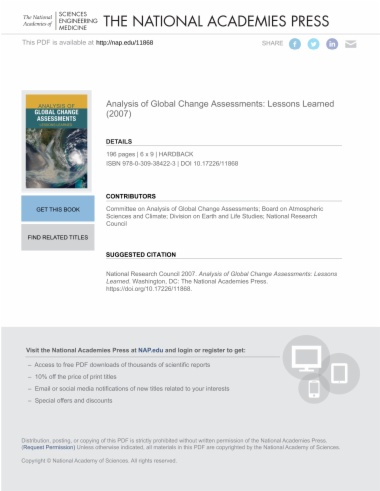

Global change assessments inform decision makers about the scientific underpinnings of a range of environmental issues, such as climate change, stratospheric ozone depletion, and loss of biodiversity. Dozens of assessments have been conducted to date by various U.S. and international groups, many of them influencing public policies, technology development, and research directions. This report analyzes strengths and weaknesses of eight past assessments to inform future efforts. Common elements of effective assessments include strong leadership, extensive engagement with interested and affected parties, a transparent science-policy interface, and well defined communication strategies. The report identifies 11 essential elements of effective assessments and recommends that future assessments include decision support tools that make use of information at the regional and local level where decisions are made.